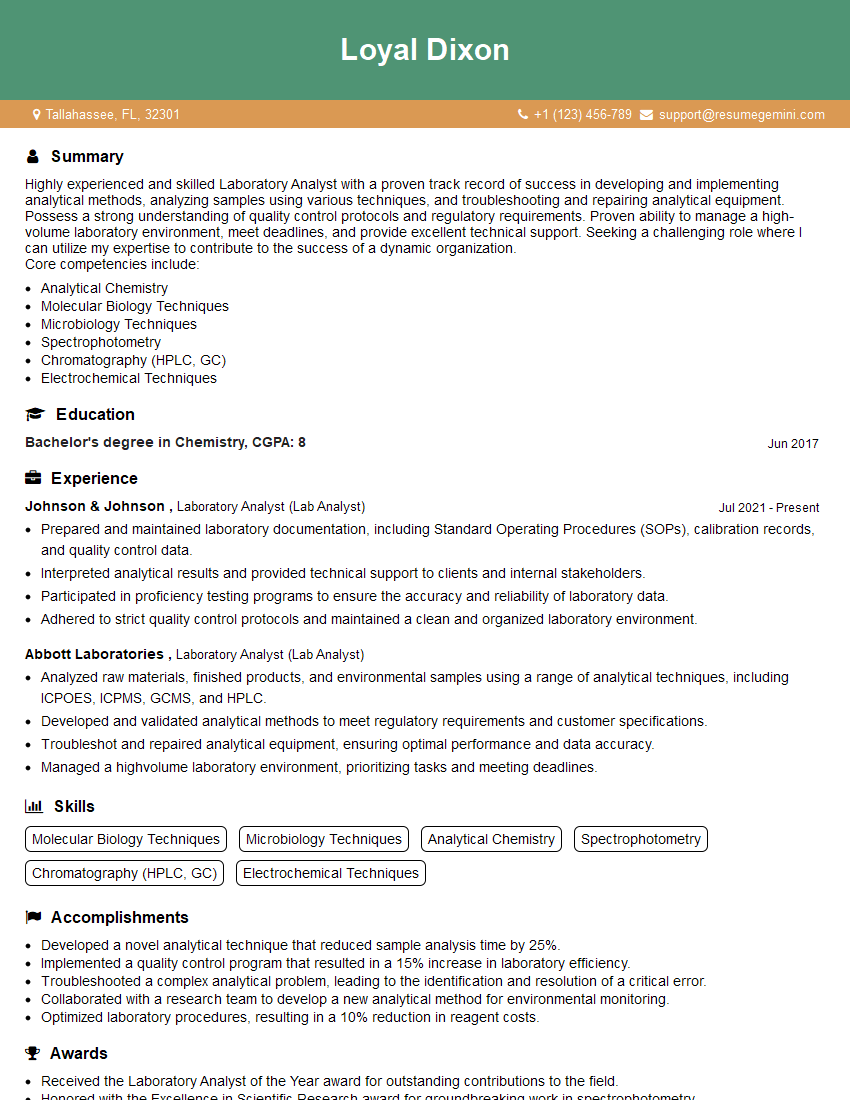Are you a seasoned Laboratory Analyst (Lab Analyst) seeking a new career path? Discover our professionally built Laboratory Analyst (Lab Analyst) Resume Template. This time-saving tool provides a solid foundation for your job search. Simply click “Edit Resume” to customize it with your unique experiences and achievements. Customize fonts and colors to match your personal style and increase your chances of landing your dream job. Explore more Resume Templates for additional options.

Loyal Dixon
Laboratory Analyst (Lab Analyst)
Summary
Highly experienced and skilled Laboratory Analyst with a proven track record of success in developing and implementing analytical methods, analyzing samples using various techniques, and troubleshooting and repairing analytical equipment. Possess a strong understanding of quality control protocols and regulatory requirements. Proven ability to manage a high-volume laboratory environment, meet deadlines, and provide excellent technical support. Seeking a challenging role where I can utilize my expertise to contribute to the success of a dynamic organization.
Core competencies include:
- Analytical Chemistry
- Molecular Biology Techniques
- Microbiology Techniques
- Spectrophotometry
- Chromatography (HPLC, GC)
- Electrochemical Techniques
Education
Bachelor’s degree in Chemistry
June 2017
Skills
- Molecular Biology Techniques
- Microbiology Techniques
- Analytical Chemistry
- Spectrophotometry
- Chromatography (HPLC, GC)
- Electrochemical Techniques
Work Experience
Laboratory Analyst (Lab Analyst)
- Prepared and maintained laboratory documentation, including Standard Operating Procedures (SOPs), calibration records, and quality control data.
- Interpreted analytical results and provided technical support to clients and internal stakeholders.
- Participated in proficiency testing programs to ensure the accuracy and reliability of laboratory data.
- Adhered to strict quality control protocols and maintained a clean and organized laboratory environment.
Laboratory Analyst (Lab Analyst)
- Analyzed raw materials, finished products, and environmental samples using a range of analytical techniques, including ICPOES, ICPMS, GCMS, and HPLC.
- Developed and validated analytical methods to meet regulatory requirements and customer specifications.
- Troubleshot and repaired analytical equipment, ensuring optimal performance and data accuracy.
- Managed a highvolume laboratory environment, prioritizing tasks and meeting deadlines.
Accomplishments
- Developed a novel analytical technique that reduced sample analysis time by 25%.
- Implemented a quality control program that resulted in a 15% increase in laboratory efficiency.
- Troubleshooted a complex analytical problem, leading to the identification and resolution of a critical error.
- Collaborated with a research team to develop a new analytical method for environmental monitoring.
- Optimized laboratory procedures, resulting in a 10% reduction in reagent costs.
Awards
- Received the Laboratory Analyst of the Year award for outstanding contributions to the field.
- Honored with the Excellence in Scientific Research award for groundbreaking work in spectrophotometry.
- Recognized with the Best Proposal Award at the national laboratory conference for innovative research ideas.
- Received a Certificate of Appreciation for exceptional contributions to the laboratorys safety program.
Certificates
- Certified Laboratory Analyst (CLA)
- American Society for Quality (ASQ) Certified Quality Technician (CQT)
- National Association for Biomedical Research (NABR) Laboratory Animal Technologist (LAT)
- OSHA 40-Hour Hazardous Waste Operations and Emergency Response (HAZWOPER)
Career Expert Tips:
- Select the ideal resume template to showcase your professional experience effectively.
- Master the art of resume writing to highlight your unique qualifications and achievements.
- Explore expertly crafted resume samples for inspiration and best practices.
- Build your best resume for free this new year with ResumeGemini. Enjoy exclusive discounts on ATS optimized resume templates.
How To Write Resume For Laboratory Analyst (Lab Analyst)
- Highlight your technical skills and experience in analytical chemistry, molecular biology, and microbiology.
- Showcase your ability to develop and validate analytical methods, troubleshoot equipment, and interpret results.
- Quantify your accomplishments with specific examples and metrics whenever possible.
- Tailor your resume to each job you apply for, highlighting the skills and experience that are most relevant to the position.
- Proofread your resume carefully for any errors before submitting it.
Essential Experience Highlights for a Strong Laboratory Analyst (Lab Analyst) Resume
- Developed and validated analytical methods to meet regulatory requirements and customer specifications.
- Analyzed raw materials, finished products, and environmental samples using a range of analytical techniques, including ICPOES, ICPMS, GCMS, and HPLC.
- Troubleshot and repaired analytical equipment, ensuring optimal performance and data accuracy.
- Managed a high-volume laboratory environment, prioritizing tasks and meeting deadlines.
- Interpreted analytical results and provided technical support to clients and internal stakeholders.
- Participated in proficiency testing programs to ensure the accuracy and reliability of laboratory data.
- Adhered to strict quality control protocols and maintained a clean and organized laboratory environment.
Frequently Asked Questions (FAQ’s) For Laboratory Analyst (Lab Analyst)
What is the role of a Laboratory Analyst?
A Laboratory Analyst is responsible for conducting chemical and biological tests on various samples to ensure quality control, product safety, and compliance with regulatory standards.
What are the educational requirements for becoming a Laboratory Analyst?
Most Laboratory Analysts hold a Bachelor’s degree in Chemistry, Biology, or a related field.
What are the key skills required for a Laboratory Analyst?
Laboratory Analysts need strong analytical skills, attention to detail, and proficiency in laboratory techniques, such as spectrophotometry, chromatography, and microscopy.
What are the career prospects for Laboratory Analysts?
Laboratory Analysts can advance to supervisory or management roles within the laboratory setting. Some may also pursue further education to specialize in a particular area of analysis, such as forensic science or environmental chemistry.
What is the average salary for a Laboratory Analyst?
The average salary for a Laboratory Analyst in the United States is around $60,000 per year.
What are the benefits of being a Laboratory Analyst?
Laboratory Analysts enjoy a stable and rewarding career with opportunities for growth and advancement. They also have the satisfaction of knowing that their work contributes to the safety and quality of products and the environment.